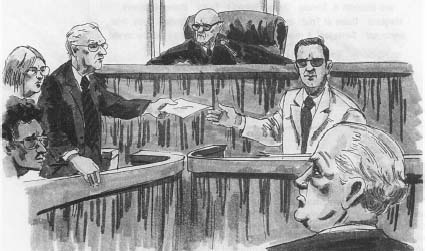Marvin Mandel Trial: 1977
Tried, Convicted, And Ultimately Acquitted
Mandel was charged with violations of federal law and not state law, namely those federal laws which prohibit mail fraud and racketeering. Prosecutors frequently invoke "mail fraud" when anything connected with a crime goes through the U.S. mail system, such as a check mailed by one defendant to another. Mandel's lawyers were M. Albert Figinski, Eugene Gressman, D. Christopher Ohly, and Arnold M. Weiner. The chief prosecutors were Russell T. Baker, Jr., Daniel J. Hurson, Barnet D. Skolnik, and Elizabeth H. Trimble. The trial began on June 1, 1977, before Judge Robert L. Taylor in Baltimore, Maryland.
 Jury foreman Howard Davis delivers the guilty verdict to the court clerk in the fraud and racketeering trial of Governor Marvin Mandel.
Jury foreman Howard Davis delivers the guilty verdict to the court clerk in the fraud and racketeering trial of Governor Marvin Mandel.
The trial lasted nearly three months, during which Mandel fought with the prosecutors over virtually every issue. For example, when Skolnik introduced telephone company records into evidence to show the existence of phone calls between Mandel and the other defendants, Mandel even denied knowledge of his own telephone number.
Question: Governor, who in [your personal office suite] had the phone number 267-5901?
Answer: Mrs. Grace Donald.
Question: And who else, sir?
Answer: Mrs. Grace Donald.
Question: Wasn't that your phone number, sir?
Answer: No, sir, that was Mrs. Grace Donald's phone number listed to the executive office. That was her phone. That is the way she handled it.
Exasperated, Skolnik presented a Maryland state government phone directory, which established that Mandel's telephone number was indeed 267-5901.
On August 21, 1977, the jury found Mandel guilty. He was sentenced to four years in prison. Mandel's attorneys appealed and won a brief victory when the U.S. Fourth Circuit Court of Appeals overturned Mandel's conviction. The Fourth Circuit reheard the appeal, however, and decided to uphold the conviction. Mandel went to prison and served 19 months of his sentence, but the rest, was commuted. Even after he served his sentence, Mandel continued to fight the conviction to clear his name.
On November 12, 1987, Judge Frederic N. Smalkin of the U.S. District Court for the District of Maryland, where Mandel had been tried, overturned Mandel's conviction. Smalkin did not deny the strong evidence of bribery and dishonesty presented at Mandel's trial, but he insisted that the prosecutors had stretched their interpretation of federal mail fraud and racketeering laws past the breaking point to bring Mandel to trial for what were really state crimes. Thus, although Mandel remains a political pariah, the outcome of his trial was, in fact, a failure for the federal prosecutors.
—Stephen G. Christianson
Suggestions for Further Reading
Jacobs, Bradford. Thimbler7ggers: the Law v. Governor Marvin Mandel. Baltimore, MD: Johns Hopkins University Press, 1984.
"Marvin Mandel's Life in Prison." Newsweek (November 24, 1980): 20-21.
"A New Verdict for Mandel." Time (November 23, 1987): 31.
'Parting Shots." The Washingtonian (July 1981): 21.
Additional topics
Law Library - American Law and Legal InformationNotable Trials and Court Cases - 1973 to 1980Marvin Mandel Trial: 1977 - Tried, Convicted, And Ultimately Acquitted